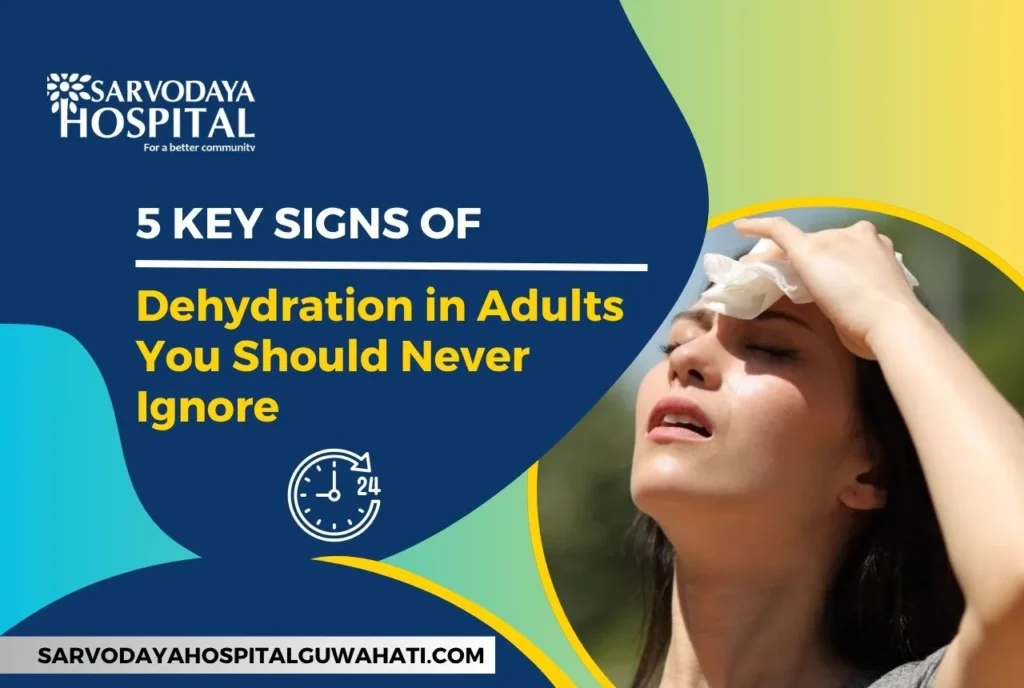Dehydration occurs when the body loses more fluids than it takes in, leading to a disruption in essential bodily functions. While it may seem like a simple issue, dehydration can have serious health consequences, especially in adults who often overlook the early signs. According to studies, nearly 75% of adults suffer from chronic dehydration, often without realizing it.
Water is vital for regulating temperature, aiding digestion, lubricating joints, and transporting nutrients. When fluid levels drop, even mildly, the body begins to exhibit warning signs that shouldn’t be ignored. Recognizing these symptoms early can prevent complications such as kidney problems, heat exhaustion, or even hospitalization.
In this blog, we’ll explore the five key signs of dehydration in adults and why it’s important to act promptly when you notice them. Understanding these symptoms could make a crucial difference to your health and well-being.
Understanding the Signs of Dehydration in Adults
Dehydration occurs when your body uses or loses more fluids than you consume, creating an imbalance that interferes with normal physiological processes. In adults, this imbalance can arise from fever, excessive sweating, diarrhea, vomiting, or certain medications such as diuretics.
Unlike children, adults may not always feel thirsty until they are already significantly dehydrated, making it even more critical to stay vigilant.
There are three primary levels of dehydration:
- Mild: Thirst, dry mouth, and slightly darker urine
- Moderate: Fatigue, dizziness, and noticeably reduced urination
- Severe: Confusion, rapid heartbeat, and lack of urination
Certain individuals are more prone to dehydration, including older adults, athletes, outdoor workers, and people with chronic illnesses like diabetes or kidney disease. Being aware of your risk factors and understanding the common causes can help you take proactive steps toward staying hydrated and healthy.
5 Critical Warning Signs You Shouldn’t Ignore
1. Changes in Urination Patterns
Urine is one of the most reliable indicators of hydration status. If you notice that your urine is dark yellow or amber-colored, it often means you’re not drinking enough water. Another red flag is a decreased frequency of urination, or worse, no urination for over 8 hours, which may signal severe dehydration needing medical attention.
Monitoring your urine color regularly can help you stay on track with your hydration needs and avoid complications.
2. Extreme Thirst and Dry Mouth
Feeling an unquenchable thirst is a clear sign that your body is already in a dehydrated state. In addition, a dry, sticky mouth and a noticeable lack of saliva are early signs that should not be ignored. These symptoms may also contribute to bad breath and other oral health concerns.
It’s important to remember that thirst isn’t always a reliable indicator, especially in older adults, whose thirst mechanisms naturally decline with age.
3. Fatigue and Cognitive Changes
Unexplained fatigue, tiredness, and low energy levels are commonly associated with dehydration. You might also experience headaches, dizziness, or confusion, particularly if fluid loss is significant. In some cases, irritability and mood swings can also occur.
Dehydration affects the brain’s ability to function optimally, which can lead to difficulty concentrating and reduced mental clarity during daily activities.
4. Physical Symptoms
A range of physical symptoms can signal dehydration. If your skin feels dry and remains “tented” when pinched (fails to quickly return to its normal state), it may indicate fluid loss. Muscle cramps are another common sign, often due to electrolyte imbalances that come with dehydration.
In more severe cases, you may notice a rapid heartbeat and faster breathing, both of which require immediate medical intervention.
5. Temperature Regulation Issues
The body relies on adequate hydration to regulate temperature. If you’re feeling overheated, experiencing chills, or notice you’re not sweating even in hot conditions, dehydration may be the cause. A fever over 102°F combined with dry skin and weakness can be a sign of serious fluid loss.
Dehydration also increases the risk of heat exhaustion and heat stroke, especially during physical activity or high temperatures.
When to Seek Medical Help
While mild dehydration can often be corrected at home, some symptoms require urgent medical care. If you or a loved one experiences confusion, fainting, rapid heartbeat, or no urination for over 8 hours, it’s time to see a doctor. People with chronic conditions such as diabetes or heart disease should be especially cautious.
At Sarvodaya Hospitals in Guwahati, we specialize in diagnosing and treating all levels of dehydration. Our emergency department is equipped with advanced diagnostic tools and IV hydration therapy for severe cases. Don’t hesitate to seek help—timely treatment can prevent complications and speed up recovery.
Prevention Strategies
The best way to fight dehydration is through consistent prevention. Experts recommend an average daily intake of 13 cups (3 liters) for men and 9 cups (2.2 liters) for women, though this may vary based on physical activity, weather, and medical conditions.
Incorporate hydrating foods like watermelon, cucumbers, oranges, and soups into your diet. Keep a water bottle with you and set reminders if you struggle to drink regularly. Drink more water before, during, and after physical activity or in hot weather.
Also, don’t overlook the importance of electrolyte balance—especially after workouts or bouts of illness. Oral rehydration solutions or electrolyte-infused drinks can help restore essential minerals like sodium and potassium. Staying hydrated is a daily habit that promotes long-term health and energy.
Stay Hydrated: Key Takeaways on the Signs of Dehydration in Adults
Recognizing the signs of dehydration in adults can protect you from serious health consequences. The five key warning signs—changes in urination, extreme thirst, fatigue, physical symptoms, and temperature regulation issues—are your body’s way of signaling that it needs more fluids. Proactive hydration is a simple yet powerful way to maintain well-being.
If you or someone you care for shows signs of severe dehydration, Sarvodaya Hospitals in Guwahati is here to help with expert care and emergency services. Don’t wait—assess your hydration habits today and make water your daily priority.


